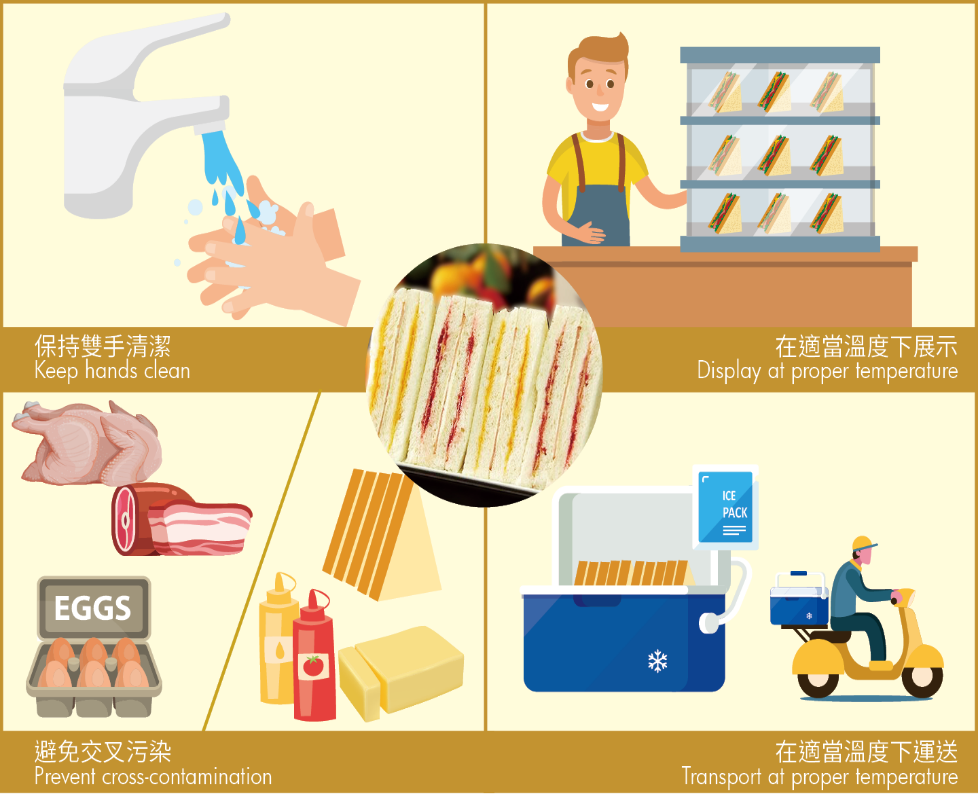
Food Safety Focus (169th Issue, August 2020) – Incident in Focus
Food Poisoning Caused by Salmonella in Sandwiches Containing Eggs
Reported by Dr. Queenie LEUNG and Dr. Lousia CHOI,
Medical and Health Officers, Risk Management Section, Centre for Food Safety
In May 2020, the Centre for Food Safety (CFS) of the Food and Environmental Hygiene Department investigated a large-scale food poisoning outbreak involving a brand of sandwiches, with a total of 99 clusters affecting 236 persons. According to the Centre for Health Protection of the Department of Health, the victims suffered from abdominal pain, vomiting, diarrhoea and fever after consumption of egg-containing sandwiches purchased from different retail shops in Hong Kong. Fifty-one of the victims required hospitalization, including one required intensive care. Stool specimens of 37 affected persons were tested positive for Group D Salmonella. Two egg-containing sandwich samples taken from a retail outlet were also found to contain Salmonella.
It was found that the sandwiches concerned were produced by a local food factory in Kwun Tong, which provided sandwiches to 12 retail outlets. Field investigation at the above food factory and retail outlets revealed a number of factors which may contribute to this food poisoning outbreak. These factors include: (1) Cross-contamination of cooked ingredients by raw ingredients as they were handled on the same working table; (2) Inadequate hand hygiene facilities as the same towel for hand drying was shared among food handlers throughout the whole day without replacement; (3) Prolonged exposure to improper holding temperature during delivery as packed sandwiches were delivered to retail outlets located in various districts in Kowloon and New Territories West in the morning round, and Hong Kong Island during the afternoon round using a single vehicle without any temperature control facilities. There were occasions when, unsold sandwiches were transported between retail outlets for replenishment of the stock, and this could further increase the delivery time; and (4) Improper storage and labelling of the finished products. During investigation, the sandwiches were found being stored at refrigerators recorded 19oC to 20.7oC in a retail outlet and no expiry date or production date was found on the package of the sandwiches for staff or customers' information.
If the sandwiches require delivering to retail outlets or storage, As a rule of thumb, keep food out of the temperature danger zone (i.e. between 4°C and 60°C) to limit the growth of microorganisms during transport and storage if the sandwiches have been left at room temperature for more than four hours, they should be discarded. When preparing food, food handlers should observe proper hand hygiene and handle raw and cooked food separately to avoid cross-contamination.
Upon knowing the incident and investigation finding, the CFS instructed the food factory and retail outlets to stop sale of all the sandwiches concerned immediately. The CFS provided health education on food safety and hygiene to the staff, and requested them to carry out thorough cleaning and disinfection of the concerned food premises. The CFS has also issued press releases to urge the public not to consume the sandwiches concerned. No further cases occurred after preventive and control measures were implemented.

Figure 1: Some Tips for Consumers to Enhance Hygiene
Key Points to Note
- Salmonella can cause severe illness and is a common food poisoning microorganism.
- Sandwiches are considered a high risk food, as sandwich preparation often involves manual handling. Contamination by food handlers or other raw or undercooked ingredients, prolonged and improper storage may increase the risk of food poisoning.
- To prevent food poisoning outbreaks, food handlers should adhere to Five Keys to Food Safety.
Advice to Consumers
- Patronise only reliable and licensed food premises.
- If sandwiches are not to be consumed immediately after purchase or preparation (including homemade ones), they should be kept in the refrigerator at or below 4oC.
Advice to the Trade
- Plan the production schedule and process ahead to avoid over-production or prepare the food way too in advance.
- During storage and transport, keep food and ingredients at proper temperature.
- Operators of food factories should provide proper hand washing facilities (e.g. liquid soap, paper towels) and clean workplace with separated areas for preparation of raw and cooked food.

